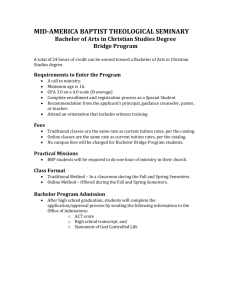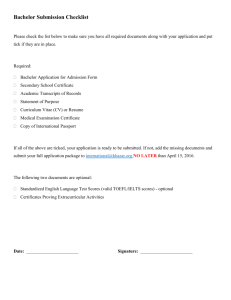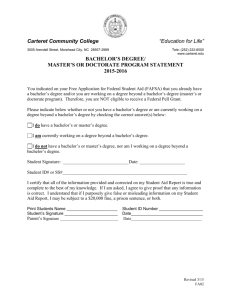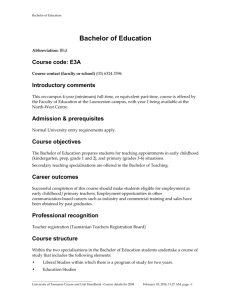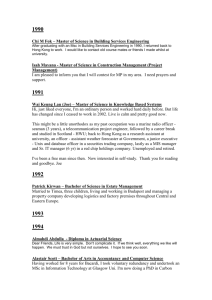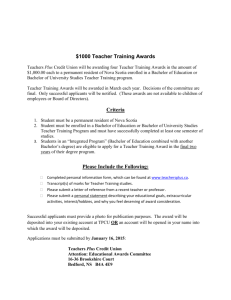Factors to Consider When Choosing a University
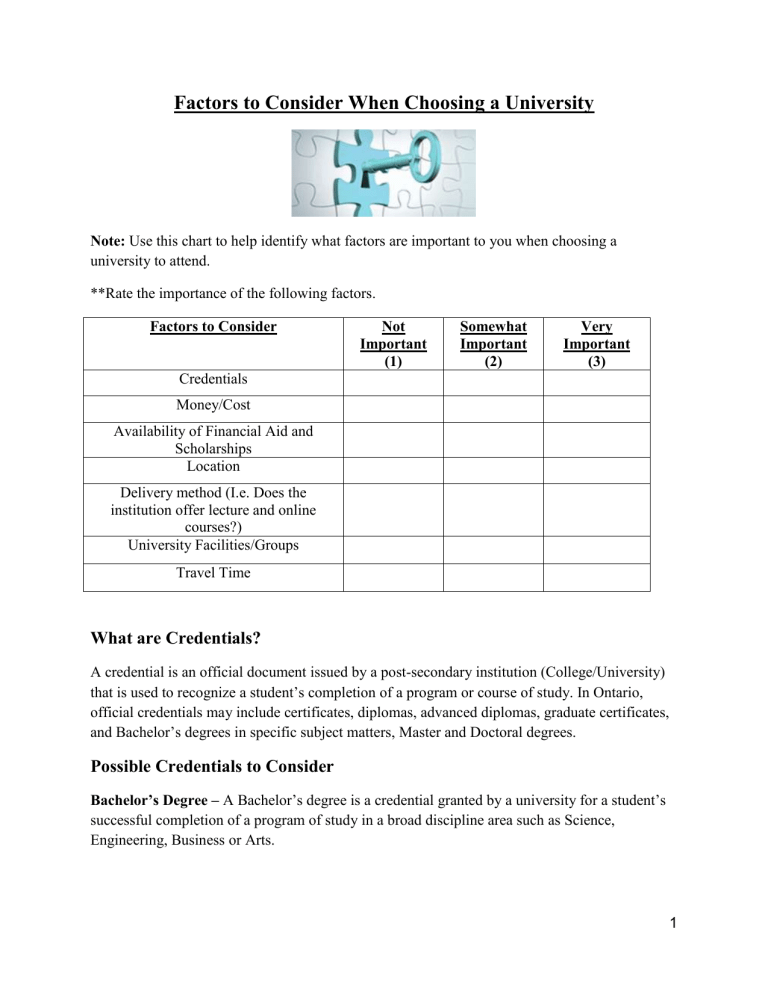
Factors to Consider When Choosing a University
Note: Use this chart to help identify what factors are important to you when choosing a university to attend.
**Rate the importance of the following factors.
Factors to Consider
Credentials
Money/Cost
Availability of Financial Aid and
Scholarships
Location
Delivery method (I.e. Does the institution offer lecture and online courses?)
University Facilities/Groups
Travel Time
Not
Important
(1)
Somewhat
Important
(2)
Very
Important
(3)
What are Credentials?
A credential is an official document issued by a post-secondary institution (College/University) that is used to recognize a student’s completion of a program or course of study. In Ontario, official credentials may include certificates, diplomas, advanced diplomas, graduate certificates, and Bachelor’s degrees in specific subject matters, Master and Doctoral degrees.
Possible Credentials to Consider
Bachelor’s Degree –
A Bachelor’s degree is a credential granted by a university for a student’s successful completion of a program of study in a broad discipline area such as Science,
Engineering, Business or Arts.
1
List of Possible Bachelor’s Degrees:
Bachelor of Arts (B.A.)
– An undergraduate degree in the liberal arts, social sciences or both that is typically completed in three to four years. Fields of study may include
English Literature, Art History, Anthropology, Sociology, Theatre Studies and Women
Studies. Depending on the university, the fields of study offered towards a Bachelor of
Arts degree may vary.
Bachelor of Commerce (B.Com) – An undergraduate degree program that focuses on the key understanding of business functions such as Accounting, Finance, Marketing and
Human Resource Management. The duration to complete a Bachelor of Commerce degree can vary from three years to four years of study.
Bachelor of Science (B.Sc.) – An undergraduate degree that is typically completed in three years to five years. Fields of study may include Biology, Mathematics, Chemistry,
Social Science, Sports/Exercise Science, Computer Science, General Science and
Engineering. Depending on the university, the fields of study offered towards a Bachelor of Science may vary.
Bachelor of Education (B.Ed.) - In order to teach in a publicly funded school in Ontario, you need to complete the Bachelor of Education degree program. Within the B.Ed. program, students will complete a one year teacher education program along with two or three teaching placements depending on the institution of choice. Upon successful completion of the program, students will receive an Ontario teaching certificate from the
Ontario College of Teachers (OCT) that will allow them to be recognized as a licensed teacher.
Honours Bachelor Degree – An Honours Bachelor's degree is typically completed in four years of full-time study and usually focuses on a particular area of study. The Honours Bachelor degree is usually ranked at a higher level of academic standing than a (general) Bachelor’s degree.
Master’s Degree
– Following a Bachelor’s degree, students may choose to obtain a Master’s degree in a particular field of study. For example, students can receive a Master’s in English
Literature, History, Business, etc. A Master’s degree allows students to continue their studies through seminar classes, smaller group discussions and coursework. Depending on the area of concentration, Master’s degrees can require one to four years of study after an Honours
Bachelor’s degree program. Most Master degree programs require students to complete a thesis or an extended research paper on a concentrated field of study.
Doctoral Degree (Doctorate)
– A Doctoral degree is the highest academic degree level and normally requires a minimum of three years of study and research that can take up to eight years to complete. During this time, a Doctoral Candidate will be working on the completion of a
2
dissertation following their Master’s degree. A dissertation is an independent research project that is designed to discover new knowledge in your concentrated field of study.
Cost
Factors
Availability of
Financial Aid and
Scholarships
Location
University
Facilities
Travel Time
What Other Factors Should You Consider?
Delivery Method of Course
Material
Some Questions to Ask
How much is tuition each semester?
What is included in tuition? Books? Bus
Transportation? Software?
What methods of payment do you accept for tuition?
Do you offer payment plans? How do they work?
What happens if I enroll, but decide I do not want to attend the university? Will I get my money back?
How much will rent be?
What types of financial aid assistance does the university offer to qualified students?
Does the university offer any grants or scholarships?
What is the criterion for selecting financial aid recipients?
What is the process for determining financial need?
Is the university located in a busy and noisy area?
Are there shopping centers, grocery stores, and restaurants close by?
Can I see myself studying here for two or three years?
Does the university offer online courses?
Are most of the classes large lecture styles?
Does the university offer a flexible and interactive learning environment for students?
What types of recreational activities does the university offer? (I.e. intramural sports?) Are these free to use?
What type of campus organizations does the university offer? (I.e. Student government, Student Clubs, etc.)
How many hours away from home is the university?
How long is the travel time if I take the train? Bus?
Remember…
Before choosing a university or degree program, make sure that you gather as much information as possible in order to make the best decision for you. Make sure you visit and tour the universities you are thinking about attending. Don’t be hesitant to talk to both faculty members and students to get a sense of the school community and programs you are interested in.
3
